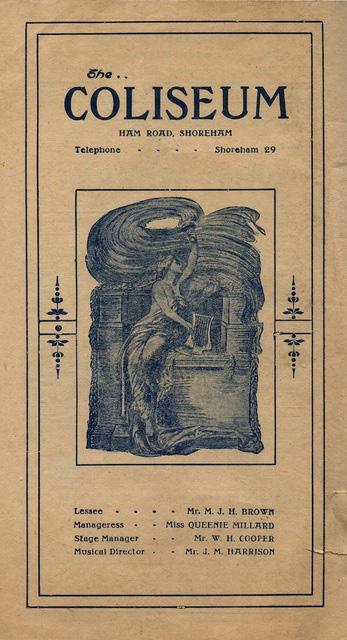
4 minute read
Trust Registration Deadline The Coliseum Theatre and ceni-
Adur Photographic Society
Tuition without Competion TRUSTEES, HERE IS WHAT YOU NEED TO KNOW ABOUT THE TRUST REGISTRATION SERVICE DEADLINE
Advertisement
Being a trustee comes with many responsibilities, and, in some cases, you will need to register a trust with the Trust Registration Service (TRS) by 1 September 2022 or you could incur a fine.
A trust is an arrangement that lets someone, known as the settlor, set money or assets aside for someone else, known as a beneficiary. A trust is managed by a trustee for the benefit of one or more beneficiaries. The settlor may set out how they want the assets in the trust to be used. There are many reasons why you may set up a trust, from passing on assets to children to generational wealth planning. What is the Trust Registration Service?: The TRS was set up in 2017 as part of an anti-money laundering directive. New rules were introduced in 2020 that require more UK trusts and some nonUK trusts to be registered with HMRC before the September deadline. Trusts set up after the deadline will have 90 days to register with the TRS.
Do you need to register the trust you’re
responsible for?: So, which trusts need to be registered before the deadline? All UK express trusts, whether or not they pay tax, must be registered unless they are on the exclusion list. An “express trust” refers to a trust that was created by a settlor, including those set up in a will, rather than those that were created through a court decision or the operation of the law. Most trusts are express trusts. If a non-UK trust becomes liable for tax on income coming from the UK or on UK assets, it will also need to be registered with the TRS. Some trusts do not need to be registered with the TRS even if they are express trusts. The exclusion list includes: • Pension schemes • Charitable trusts • Will trusts that are wound up within 2 years of death • Policy trusts that hold financial protection that pays out on death or critical illness. Once a trust is registered, you will receive a PDF copy of a report to show proof of registration that you should keep in a safe place. If the trust is taxable, you must declare the register is up to date each year by 31 January. Do you need help managing a trust?: As a trustee, sometimes your role and responsibilities may seem overwhelming. If you’re a trustee, it’s important to keep up to date with changes and have confidence in the financial decisions you make. We’re here to offer you support. Please contact us on 01273 774855 or email advice@pembrokefs.co.uk if you would like more information and quote reference PFSIS.
The Financial Conduct Authority does not regulate estate planning.
T. 01273 774855 E. advice@pembrokefs.co.uk W. www.pembrokefinancial.co.uk
Marlborough House, 102-110 High Street, Shoreham-by-Sea BN43 5DB Keith Relf & Keith Bonner - Managing Partners
The Coliseum Theatre and Cinema
First known as the Garrison Theatre, the building later known as The Coliseum was built in Ham Road, Shoreham-by-Sea in 1916 during the First World War.
It was designed to entertain the soldiers based at the Slonk Hill and Southwick Green army camps. The stage was thirty foot deep with a twenty-eight foot wide front arch and the theatre was able to seat an audience of over eight hundred people. Shows continued to tour in after the First World War. One was Arthur Rosebery’s wartime melodrama, ‘For Sweethearts and Wives’ performed on the 30th of June 1919. ‘Love and the Law’ was a play by P.T Selbit. Its theme was the abuse of police power, in which to cover for their mistake the police commit perjury to ensure the conviction of a wrongly arrested innocent woman. It was performed at the theatre from the 8th of September 1919. In 1920, the theatre was converted into a cinema by addition of projection booth to the back of the stage, allowing it to display films via the rear of the canvas screen. Queenie Millard became the manageress and ticket prices ranged from 5d to 1 shilling and 10d. The Theatre/Cinema was taken over by the Blue Flash Cinema Company Ltd. Major Rupert Charles Godfrey Middleton of the 4th Battalion of the Royal Sussex Regiment founded this company. During the First World War in 1914, he had left the legal profession where at the age of twenty-three he had qualified as a barrister, to volunteer for the army. Serving with distinction in Gallipoli he had been awarded the Military Cross. With other officers of the Royal Sussex Regiment he had formed the Blue Flash Association in which membership was exclusive to the Sussex Rifle Volunteers and the soldiers of the Royal Sussex Regiment. A blue flash badge was emblazoned on their uniforms. The association’s intention was that after war it would support its members and find employment for them. The officers became directors of the Blue Flash Cinema Company Ltd. In the age of the silent movie, the now out of work musicians of the regimental band were formed into bands that were employed in the Blue Flash cinema chain’s orchestra pits during the screening of the films. The first cinema the company took over was Shoreham’s The Garrison in 1923 and it was renamed The Coliseum. The telephone number for it at the time was (01273) 29. Its manager was still Queenie Millard. The stage manager was a Mr W. H. Cooper and the musical director was Mr. J. M. Harrison. The usherette was a Selina Moore. In 1925, Miss Florence Tyrell took over the licence of the premises and theatre shows returned, with a staging of the war melodrama ‘The Man Who Stayed Home’ on the 10th of











